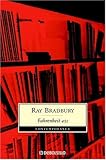 Stranger in a Strange Land
Stranger in a Strange Land by
Robert A. Heinlein
My rating:
4 of 5 stars
Heinlein is a master of the literary craft. Here in Stranger in a Strange Land he interweaves human relations, large ideas (theology), and the art of the story. The story a Stranger in a Strange Land takes place in a New America, that is one world ordered hegemony. The world has made missions to mars and has set up a space colony there. The space colony had been deserted on the planes of Mars. The man from mars is found after many years of exposure to an alien race. The climax resolves whether Michael Valentine Smith will be excepted by the people of Earth. At times this book gets bogged down in Heinlein's philosophy, so it can be a difficult read.
What I liked about the book is its deep analysis of Faith. Heinlein first looks at the cult of the Fosterites. A cult where everyone is happy, and everyone thinks as a one happy unit. (I would like to go deeper into describing the Fosterites, but I am afraid that this would lead you down a rabbit hole and would maybe bore you deeply.)
Then he looks at how Michael Valentine Smith twists the Abrahamic religions to make a cult that combines elements of Confucius, Buddhism, Hinduism, Catholicism, Protestantism, Islam, and Judaism.
The religion is based on the wisdom of the old ones (Confucius). (I am only all that I Grok.(Buddhism)) The perfect wisdom of the elders is not to be disputed at all. The cult members become entwined by a sharing of water together. They see each other as all Gods.(Brahman Hindu) Thou art god and so are my Guinea pigs and Lovebird. The religion replaces God and put man in God’s place, this allows man to worship created things.
When God’s proper place, to be above all, is replaced all is left in Chaos. A chaos I imagine to be like the ending of the Demolished Man by Alfred Bester. This chaos is a place of no form at all, the lizard eats his own tail and poof he is no longer.
Because man is now God like, the divine things are the things that connect man in deeper communication. Sex is seen as sharing deeper with many people. The communal orgasm is sacred, a great religious experience.(Athenian Greek Goddess Cults) Cannibalism is the holiest way to die for it is taking the spirit of the other deeply into the body of the collective (Native American Ritual).
Stranger in a Strange Land raised the questions:
What does it mean to be both God and man?
Why could not Joseph and Mary give birth to the messiah?
Why did it need to be a virginal birth?
What becomes lost when the Messiah is merely a superman?
(Loved this book and Clucked it Loud)
View all my reviews





















